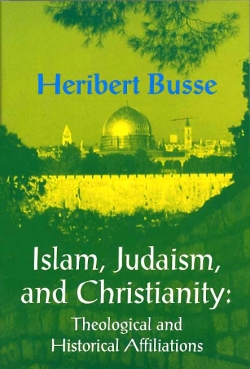 Islam is by nature and history related to Judaism and Christianity. Muhammad grappled with conflicting attitudes toward both religions for a long period before opting for his own way. Ultimately, he acknowledged Judaism and Christianity as independent but less legitimate religions than Islam.
Islam is by nature and history related to Judaism and Christianity. Muhammad grappled with conflicting attitudes toward both religions for a long period before opting for his own way. Ultimately, he acknowledged Judaism and Christianity as independent but less legitimate religions than Islam.
The book opens with an analysis of the religious and political situation on the Arab peninsula and neighboring countries in Muhammad’s time, including the role of the Jews, Christian groups and other eminent religions, sanctuaries, and merchant routes, all in relation to Muhammad’s life and work. A final section covers the practice of co-existence of these three religions through the centuries up to the modern era.
This book illustrates with examples and citations the many ways in which Muhammad used biblical narratives to illustrate faith and actions in the spirit of the Koran, and how the prophet familiarized himself with a significant corpus of Old Testament texts through Christian transmission. Included are major narratives from the Old Testament that are retold in the Koran: the stories of Cain and Abel, Abraham and the construction or cleansing of the Ka’ba, Moses (who appears in 40 sections), Saul, Goliath, David, and Solomon, among many others. The analysis of narratives of the New Testament in the Koran includes the life of Jesus, the Last Supper, Muhammad’s argument that Jesus was a human rather than God, and the denial of the Crucifixion.
